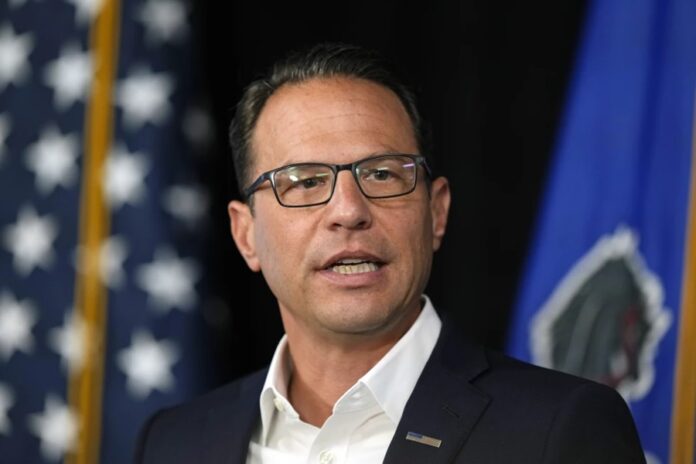
HARRISBURG, Pa.— Gov. Josh Shapiro said Friday that he will divert more than $150 million in federal highway funding to provide a one-time injection of cash to help Philadelphia’s mass transit system avoid near-term service cutbacks and fare increases.
Shapiro’s announcement drew blowback from Republican lawmakers, who say their districts will lose money, and comes as many transit agencies are in a severe financial crunch
Federal COVID-19 relief for transit agencies is phasing out and the Southeastern Pennsylvania Transportation Authority and other major transit agencies around the country are struggling to regain ridership lost during the pandemic.
Shapiro, a Democrat, said the $153 million can help SEPTA maintain services and avoid steeper fare increases in hopes that he can come to an agreement on a wider transportation funding deal with state lawmakers by next summer.
But, he said, while mass transit agencies across Pennsylvania are struggling, SEPTA wasn’t going to make it to next summer without dramatically raising prices and significant cuts in services.
“I’m here to tell you, we can’t let that happen,” Shapiro told an audience of local and state officials at a news conference at a SEPTA transit station in northeast Philadelphia.
Shapiro also said Philadelphia and its four suburban counties had agreed to boost their contribution to SEPTA.
Shapiro said it is critical that SEPTA maintain services for everyday commuters and ahead of major tourism attractions, including events connected to the nation’s 250th anniversary celebration in 2026, the FIFA World Cup and Major League Baseball’s all-star game.
SEPTA’s board on Thursday approved an average fare increase of 7.5%, but the agency said the federal highway funding will allow it to hold off on a planned 21% increase scheduled for Jan. 1 and reconsider service cuts targeted to begin next summer.
The nation’s sixth-largest mass transit system, SEPTA is facing an annual structural budget deficit of $240 million.
SEPTA had characterized the need for fare increases and service cutbacks as a “death spiral,” while the region’s boosters and representatives had said the cutbacks would damage the local economy.
The service cuts were planned to take effect July 1 and were to include eliminating and shortening routes, and reducing the frequency of bus, trolley, subway, and Regional Rail service.
Shapiro said the federal highway dollars had been slated for seven projects — on Interstate 95 in Philadelphia and I-80 in Columbia County, I-79 in Mercer County, I-80 in Jefferson County, I-70 in Washington County and and I-83 in York County — that have not been bid out yet and that he pledged to still get done on time.
Diverting highway funds is allowable under federal law. Former Gov. Ed Rendell did it in 2005 and 2010 to help transit agencies, while shifting the money is routine in some other states.
Earlier this year, SEPTA lost out on about $161 million when the Republican-controlled state Senate didn’t go along with Shapiro’s proposal for $283 million in new state aid to public transit. Instead, lawmakers approved a one-time $80 million payment to the state trust fund for transit systems, of which SEPTA got $46 million.
Republican lawmakers have said that Shapiro must come up new money to pay for more transit aid and that extra transit aid must come packaged with more money for highway projects that will benefit the rest of Pennsylvania.
On Friday, Shapiro blamed the Senate’s Republican majority, saying he agreed to their demands but that “the Senate was never able to get it done.”
Republicans bristled at Shapiro’s characterization, suggested that SEPTA has structural problems that it must fix and criticized his move to divert highway money from Republican-represented areas of Pennsylvania.
“The action by the governor today will do nothing but harm millions of hard-working Pennsylvanians by depriving their areas of critical infrastructure,” Senate Majority Leader Joe Pittman, R-Indiana, said in a statement.
The Democratic-controlled House of Representatives passed Shapiro’s plan last March.






